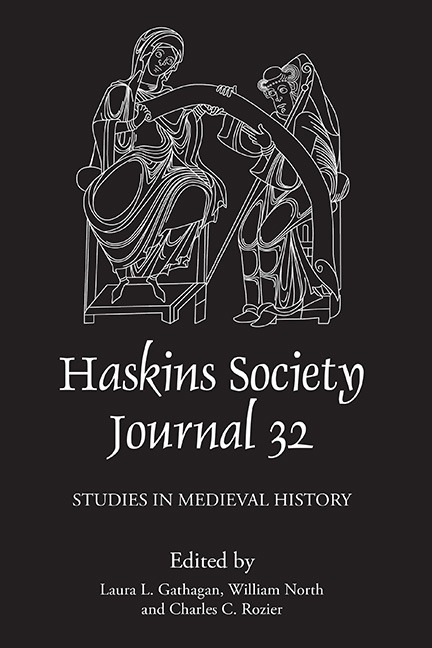Book contents
- Frontmatter
- Contents
- List of Illustrations
- Editors’ Note
- Abbreviations
- 1 Nearly-Not Miracles of the Carolingian Era: A Hypothesis
- 2 Noble Fathers and Low-Status Daughters in the Eleventh Century: Rilint, libera, and Hiltigund, presbyterissa
- 3 The Norman Conquest of England, the Papacy, and the Papal Banner
- 4 Ostmen, Normans, or Norwegians? Names and Identities in the Irish Sea World c. 1100
- 5 The Origins of Administrative Lordship in Medieval Flanders: A Reassessment
- 6 Multiple Allegiance and Its Impact: England and Normandy, 1066–c. 1204
- 7 The Wiley Lecture: Monsters in Anglo-Norman Historiography; Two Notes on William of Newburgh’s Revenants
- 8 A Female King or a Good Wife and a Great Mother? Seals, Coins, and the Epitaphic Legacy of the Empress Matilda
- 9 Harangue or Homily? Walter Espec, Deuteronomy, and the Renewal of the Covenant in Aelred of Rievaulx’s Relatio de Standardo
- 10 Anger Management: Modeling Christian Kingship in Peter of Blois’s Dialogus
- 11 In His Name: Religion as Administrative Strategy in Thirteenth-Century Champagne (and Navarre?)
- 12 Warhorse Markets and Social Status of Combatants under Edward I of England, 1296–1307
2 - Noble Fathers and Low-Status Daughters in the Eleventh Century: Rilint, libera, and Hiltigund, presbyterissa
Published online by Cambridge University Press: 19 May 2022
- Frontmatter
- Contents
- List of Illustrations
- Editors’ Note
- Abbreviations
- 1 Nearly-Not Miracles of the Carolingian Era: A Hypothesis
- 2 Noble Fathers and Low-Status Daughters in the Eleventh Century: Rilint, libera, and Hiltigund, presbyterissa
- 3 The Norman Conquest of England, the Papacy, and the Papal Banner
- 4 Ostmen, Normans, or Norwegians? Names and Identities in the Irish Sea World c. 1100
- 5 The Origins of Administrative Lordship in Medieval Flanders: A Reassessment
- 6 Multiple Allegiance and Its Impact: England and Normandy, 1066–c. 1204
- 7 The Wiley Lecture: Monsters in Anglo-Norman Historiography; Two Notes on William of Newburgh’s Revenants
- 8 A Female King or a Good Wife and a Great Mother? Seals, Coins, and the Epitaphic Legacy of the Empress Matilda
- 9 Harangue or Homily? Walter Espec, Deuteronomy, and the Renewal of the Covenant in Aelred of Rievaulx’s Relatio de Standardo
- 10 Anger Management: Modeling Christian Kingship in Peter of Blois’s Dialogus
- 11 In His Name: Religion as Administrative Strategy in Thirteenth-Century Champagne (and Navarre?)
- 12 Warhorse Markets and Social Status of Combatants under Edward I of England, 1296–1307
Summary
In the second quarter of the eleventh century, a nobleman named Maganus realized that his end was near. He gathered up his wife and sons, and ‘before a large crowd’ put his affairs in order. Maganus's last acts were recorded by a monk at the Bavarian monastery of Tegernsee. According to the monk's report, which was later copied into the Tegernsee Traditionsbuch, Maganus engaged in an unusual transaction on the day of his death: he offered two enslaved women (ancillae) to the altar of St Quirinus, patron saint of the monastery, and received in return one, ‘who’, the monk reported, ‘was also his daughter’ (quae et filia sua fuit). Maganus's wife and sons looked on as he then freed this daughter (eam liberam fecit), formerly an ancilla belonging to the familia of Tegernsee (its dependent community of unfree women and men), and gave her half of his properties in the small village of Baiernrain, some 30 kilometers to the north. The monk reports nothing further: we do not hear, for instance, how Maganus's daughter approached her new life as a free woman, or what interactions, if any, she had with her half-brothers. We do know, however, that Maganus's gift made his formerly servile daughter a lord herself: the land in Baiernrain came with associated human property, both male and female (cum servis et ancillis).
Maganus's concern for his daughter's future punctuated his last days, bringing father and daughter together for the first, and only, time into the historical record. However, for the Tegernsee monk who recorded the manumission, the human story of Maganus's biological family was less interesting than were the circumstances of his involvement with the monastery and its dependent familia. Indeed, the monk's report breaks with the Traditionsbuch's more typical and terse accounting of gifts made ‘to the altar’ and ‘for the cure of the soul’to explain how Maganus – a nobleman – came to have a daughter among the unfree dependents at Tegernsee. As we hear, the story began with Maganus's lord, Adalpero, who had provided Maganus with an ancilla of Tegernsee named Engelraht. Maganus subsequently ‘used’ her as a concubine (ea more concubinae usus est) and she gave birth to a daughter, Rilint, who inherited her mother's servile status and evidently remained among the property of Tegernsee until Maganus's deathbed decision to manumit her.
- Type
- Chapter
- Information
- Publisher: Boydell & BrewerPrint publication year: 2021



